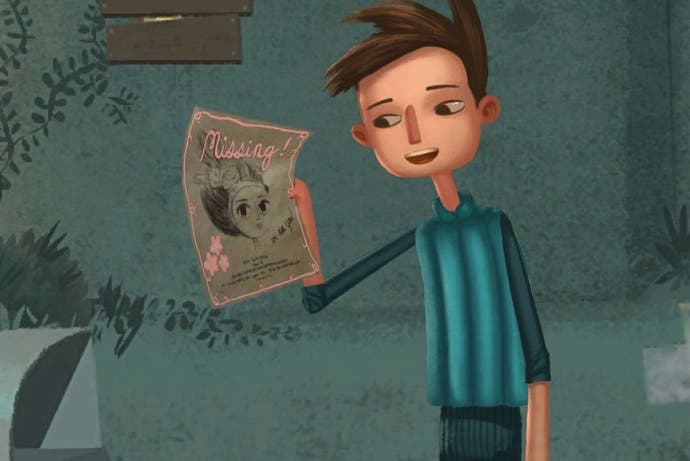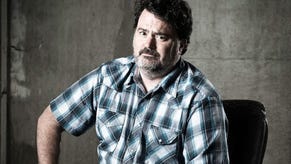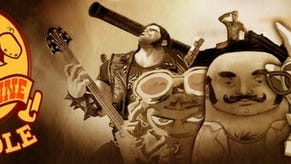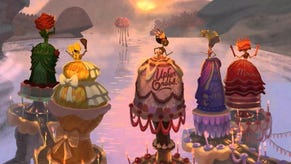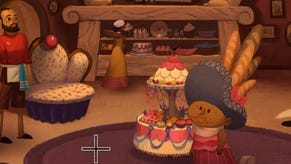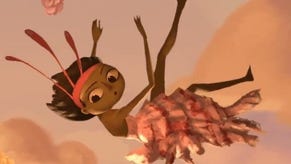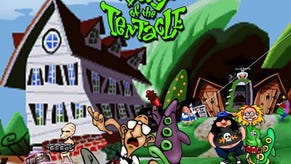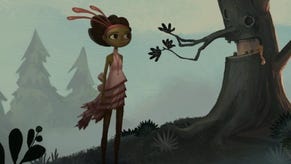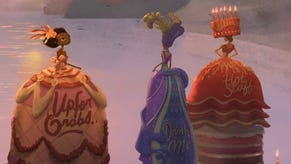Broken Age Act 2 review
Breaking good?
Editor's note: Broken Age's second and final act is out this week. We reviewed the first act of Tim Schafer and Double Fine's return to adventure games early last year, and found it attractive but a little hollow. "Fans will be forgiven for expecting something a little more chewy, a little more experimental, from a developer who made his name by turning adventure games upside down," Dan Whitehead said in his review. Today, Dan returns to the second act to see what's changed. Be warned - spoilers and discussion for act one lay below.
It may not be the longest delay in gaming, but a 16-month cliffhanger is still a tough burden to drop on your players, even more so when the cliffhanger in question comes at a critical juncture in a narrative adventure. Such is the hurdle Double Fine has set itself with its fractured - or, yes, broken - development of Broken Age.
Back in January 2014, we left parallel heroes Vella and Shay as their storylines finally converged. Shay, raised alone in a stiflingly risk-free environment aboard a spaceship, had ventured beyond the cossetted routines laid out for him and discovered that his world wasn't everything he thought it was.
Meanwhile Vella, groomed to be sacrificed to the monster Mog Chothra, had similarly stepped beyond the roles her society had laid out for her, and taken control of her own destiny. She faced the beast and won - revealing an enormous lie encompassing both her and Shay's experiences in the process.
Act 2 picks up immediately at this point. Indeed, for players who have yet to start the adventure, the change will be seamless. Downloaded as a free update to the existing game file, and swapping over with no fanfare or title card, the "Act 2" aspect is more to accommodate the curious release schedule than any shift in game structure.
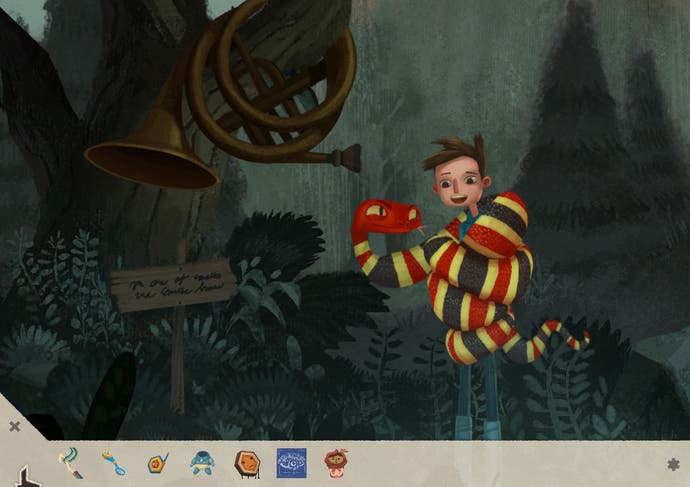
Having brought its heroes together the first time, a clumsy accident immediately separates Vella and Shay once more. Vella is now trapped on board Shay's old ship, while Shay is left stranded in Vella's world. In a story built on a bedrock of parallels and symmetry, it's an idea with merit. It allows each character to learn more about the other in an organic way, without resorting to too many leaden exposition dumps.
In gameplay terms, the choice proves more problematic. At the point where most adventures would take its heroes to new locations to meet new characters, Broken Age opts to stay in the same places - albeit slightly changed by the preceding events. There are only a few new characters, with most of your interactions as both Vella and Shay involving the same characters who populated Act 1.
More disappointing, there are almost no new locations. You'll once again be going back and forth through the familiar handful of rooms and corridors on Shay's ship, and rattling between the same clouds, beach and forest that Vella so completely explored. I kept waiting for the story to move on, to give me somewhere fresh to discover, but it never comes. The best you get is access, literally at the very end of the game, to just three new rooms beneath an existing location. Everywhere else is somewhere you've already been.
In any adventure game, such geographical inertia would be frustrating. Having spent over a year delivering this concluding section, fans will be justified in wondering what necessitated such a delay. Familiarity doesn't quite breed contempt in this case - Double Fine's aesthetic and wit is too strong for that - but it saps the experience of any sense of forward momentum, of being on an adventure, and by the end what had once been charming places and characters have all but lost their appeal.

This chunk of the game at least addresses one of the major flaws in the first half. It was easy to glide through the opening section of the game without really coming up against any truly challenging puzzles - or at least nothing that felt in keeping with Tim Schafer's storied legacy in the adventure genre.
That's no longer the case, as this half of the game is not only denser in terms of the amount of puzzling required - to the extent that conversation and narrative takes a back seat for much of it - but in terms of variety and difficulty. There are, finally, puzzles here that will require a pen and paper to work out, as well as more complex inventory puzzles, tasks that require lateral thinking and moments of inspiration. Those seeking an adventure that feels like the classics will find a lot more to enjoy, even if the game still has a weakness for spelling out certain solutions.
Only a few feel unfair or obtuse. Sometimes the large and indiscriminate pointer makes it hard to distinguish important interactions from nearby pointless objects. Sometimes, the game's bisected release counts against it. One action that is essential in the game's final moments requires you to remember the fate of a character that hasn't been seen since Act 1, and after 16 months it took me a while to recall where they'd been left, and what the implications of that were.
It all builds to a conclusion that, while as well-written and handsomely staged as ever, fell a little flat for me. There are some stock villains, introduced very late in the game, whose schemes are poorly sketched and hastily explained. Their arrival forces the story into a more traditional climax, and leaves its two main characters unexplored right when it matters most.
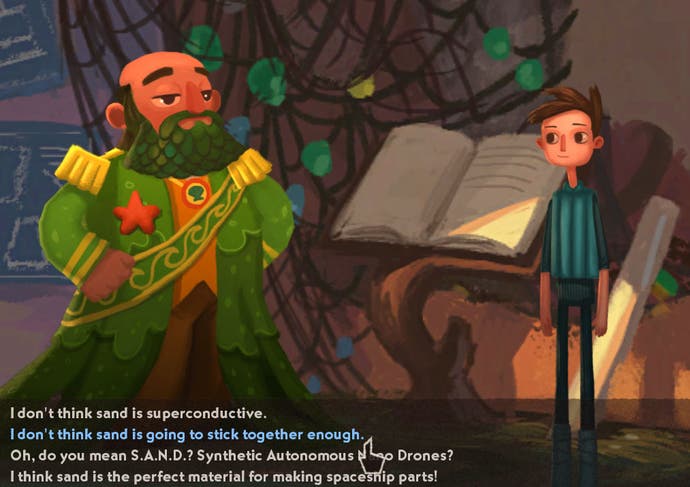
The deftly portrayed teenage yearning for self-definition, the friction between youthful naiveté and cynical experience, the sly commentary on restrictive gender roles - none of that really comes to anything. The wit and heart that drove the first half of the game takes a back seat in the dash to an action-packed ending, and anyone hoping for the more intimate thematic parallels between Shay and Vella to pay off in a final act flourish will sadly be left wanting.
Despite these shortcomings, Schafer's knack for memorable lines and quirky characters remains, the puzzles are stronger and the second half demands much more thought and contemplation to finish, yet the whole remains unsatisfying. This is largely down to the decision to leave Shay and Vella retreading the exact same scenes as before, albeit from each other's perspective. It physically leaves their stories with nowhere meaningful to go. In a story that has been driven from the start by its character's need to break out of routine, it's a painfully ironic design choice.
As much as there is to enjoy on a moment by moment basis, there's a sense that this is a game that's been torn in more ways than one. Torn between being a PC adventure in the classic style for the devoted hardcore, and a casual adventure that can also work for newcomers. Torn between two storylines that teasingly reflect each other, but never quite overlap in a meaningful way. Torn between repeating gameplay elements from its first half while improving on the mechanics for the second. It's always a very likeable game, but one that never fully reconciles itself, never seizes its potential in the way Vella and Shay strive to.
In the end, it's the surface details - the dry and gentle wit, the winsome voice acting, and the gorgeous design - that lash it all together. The deeper elements, the bones that might give it structural strength, feel thin. Broken Age doesn't quite suffer the fate implied by its title, but there are clearly fractures that time has failed to heal.
